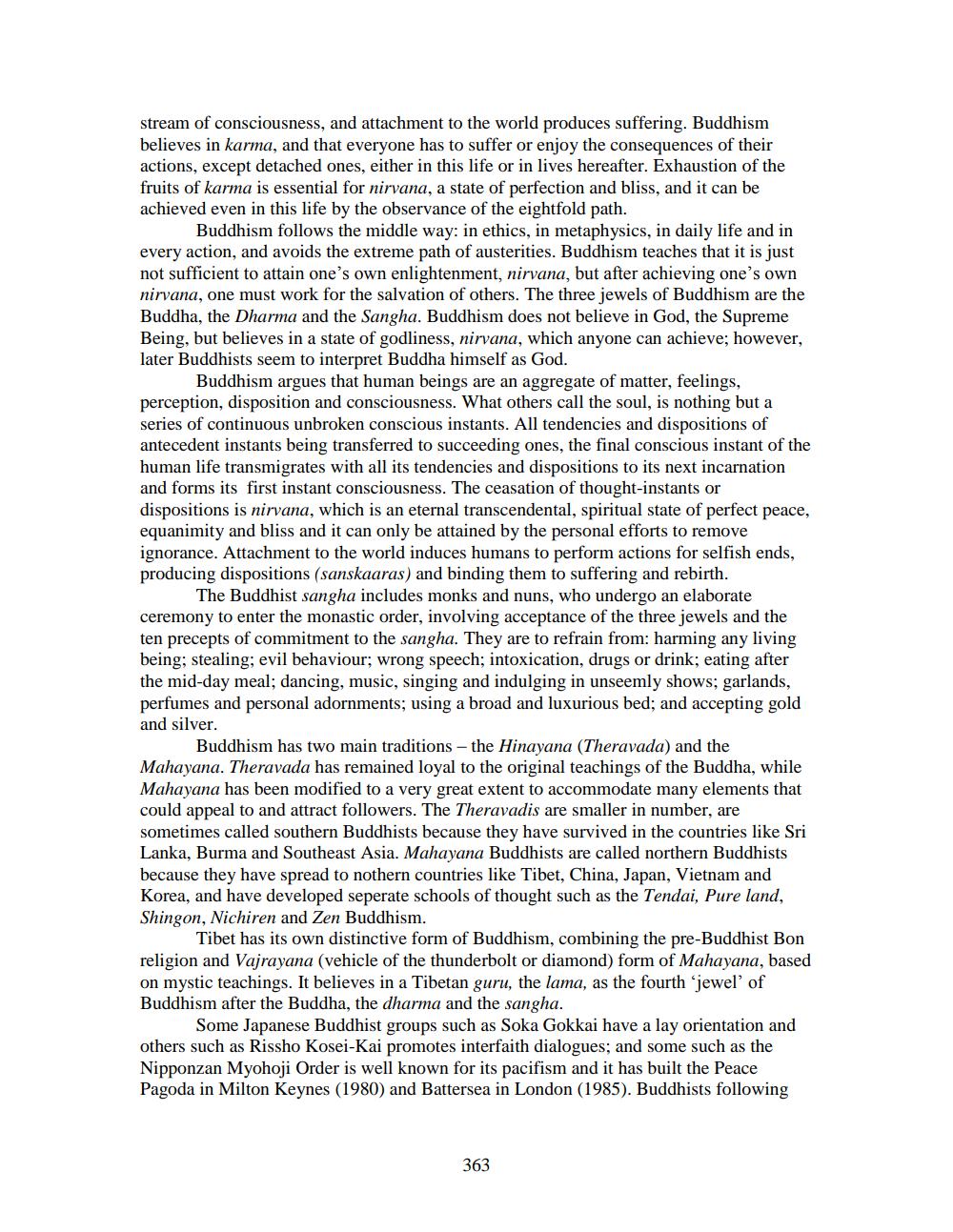________________
stream of consciousness, and attachment to the world produces suffering. Buddhism believes in karma, and that everyone has to suffer or enjoy the consequences of their actions, except detached ones, either in this life or in lives hereafter. Exhaustion of the fruits of karma is essential for nirvana, a state of perfection and bliss, and it can be achieved even in this life by the observance of the eightfold path.
Buddhism follows the middle way: in ethics, in metaphysics, in daily life and in every action, and avoids the extreme path of austerities. Buddhism teaches that it is just not sufficient to attain one's own enlightenment, nirvana, but after achieving one's own nirvana, one must work for the salvation of others. The three jewels of Buddhism are the Buddha, the Dharma and the Sangha. Buddhism does not believe in God, the Supreme Being, but believes in a state of godliness, nirvana, which anyone can achieve; however, later Buddhists seem to interpret Buddha himself as God.
Buddhism argues that human beings are an aggregate of matter, feelings, perception, disposition and consciousness. What others call the soul, is nothing but a series of continuous unbroken conscious instants. All tendencies and dispositions of antecedent instants being transferred to succeeding ones, the final conscious instant of the human life transmigrates with all its tendencies and dispositions to its next incarnation and forms its first instant consciousness. The ceasation of thought-instants or dispositions is nirvana, which is an eternal transcendental, spiritual state of perfect peace, equanimity and bliss and it can only be attained by the personal efforts to remove ignorance. Attachment to the world induces humans to perform actions for selfish ends, producing dispositions (sanskaaras) and binding them to suffering and rebirth.
The Buddhist sangha includes monks and nuns, who undergo an elaborate ceremony to enter the monastic order, involving acceptance of the three jewels and the ten precepts of commitment to the sangha. They are to refrain from: harming any living being; stealing; evil behaviour; wrong speech; intoxication, drugs or drink; eating after the mid-day meal; dancing, music, singing and indulging in unseemly shows; garlands, perfumes and personal adornments; using a broad and luxurious bed; and accepting gold and silver.
Buddhism has two main traditions - the Hinayana (Theravada) and the Mahayana. Theravada has remained loyal to the original teachings of the Buddha, while Mahayana has been modified to a very great extent to accommodate many elements that could appeal to and attract followers. The Theravadis are smaller in number, are sometimes called southern Buddhists because they have survived in the countries like Sri Lanka, Burma and Southeast Asia. Mahayana Buddhists are called northern Buddhists because they have spread to nothern countries like Tibet, China, Japan, Vietnam and Korea, and have developed seperate schools of thought such as the Tendai, Pure land, Shingon, Nichiren and Zen Buddhism.
Tibet has its own distinctive form of Buddhism, combining the pre-Buddhist Bon religion and Vajrayana (vehicle of the thunderbolt or diamond) form of Mahayana, based on mystic teachings. It believes in a Tibetan guru, the lama, as the fourth 'jewel' of Buddhism after the Buddha, the dharma and the sangha.
Some Japanese Buddhist groups such as Soka Gokkai have a lay orientation and others such as Rissho Kosei-Kai promotes interfaith dialogues; and some such as the Nipponzan Myohoji Order is well known for its pacifism and it has built the Peace Pagoda in Milton Keynes (1980) and Battersea in London (1985). Buddhists following
363




